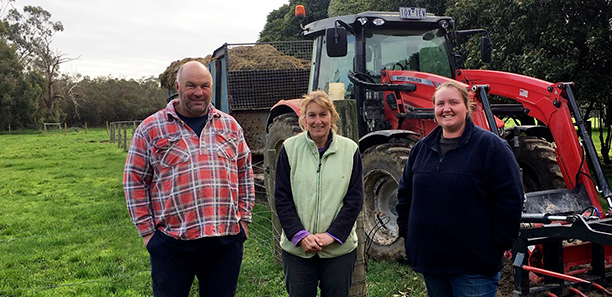
Ashlee Buckley hasn’t looked back since completing her Certificate II in Agriculture while she was in secondary school and working casually on her parent’s farm.
After completing Year 12, Ashlee posted an advertisement on social media looking for a farm-hand role.
She’d considered becoming a kindergarten teacher but after a stint of relief milking and farm work, Ashlee soon realised she “really enjoyed” what she was doing and “just wanted more”.
Mark and Lisa Wilms, who were looking for a new staff member to join their farm business milking 380 cows at Willow Grove, were quick to contact Ashlee. Given Mark had first-hand experience of working as a dairy apprentice when he was just 16 years old, he jumped at the opportunity to help someone who was keen to progress.
“We just talked to Ashlee about her career goals and knew we wanted to support her in the next step,” he said.
Mark and Lisa have seen the benefits of employing a dairy trainee in their farm business. They feel “it is a win for both sides” in terms of the employee gaining formal qualifications and being able to grow and learn new skills while on the job.
While working for Mark and Lisa, Ashlee continued her studies through to the completion of Certificate IV in Agriculture. Mark and Lisa found they were able to fit in with Ashlee’s one day per week of TAFE during the school term.
“We were just flexible with this and worked around this making it fit with the program of the farm,” Mark said.
Ashlee has loved being able to combine the experience of learning on farm with the opportunity to learn more of the technical side of farming through TAFE Gippsland.
“Learning more about why you do things on the farm, like what fertiliser needs to be applied to the paddock and an understanding on how they work out the rate required,” she said.
Ashlee firmly believes that, if she only had the farm experience, she would be missing out on something. Doing the education side has enabled her to “see the picture from both sides”.
Keen to gain a deeper knowledge of managing a whole farm business and people, Ashlee continued studying while working and now has only two units of the Diploma in Agriculture to go.
Mark and Lisa saw this as a great opportunity to stretch Ashlee’s capabilities, so for the past six months she has been working in a management position with Mark and Lisa on another farm, milking up to 290 cows just down the road from the home farm.
“We knew Ashlee was capable of doing this and encouraged her to take on the challenge with our support,” Mark said.
Ashlee feels it was a good choice that has advanced her training considerably.
“Taking on the responsibility of managing a farm boosts your confidence and you think at the end of the day I’ve done that. It’s a great sense of satisfaction,” she said.
Mark and Lisa feel the biggest thing they have learnt about themselves and as an employer is how important communication is. It is critical that instructions are clear and understood. When giving an instruction or setting a task they see how valuable it is to “ask the trainee to say what they are going to do, to make sure we are all on the same page”.
Ashlee has found that the guidance and encouragement she has been given while completing her traineeship has definitely been a big part of her success. She sees the importance of explaining the details about why things are done on the farm and having “a boss that is willing to help you out and work with you to be able to advance”.
According to Mark and Lisa the secret to a successful trainee partnership has been having a motivated and enthusiastic person with a genuine interest.
“Ash wants to know why things happen, she is curious and shows initiative … and it’s not just a job to her.”
Well done and best of luck Ashlee.
Setting up a traineeship:
An agricultural traineeship is a formal training arrangement between an employer and trainee that combines training that is industry best practice and learning on-the-job to achieve a nationally recognised qualification.
A trainee can be full-time, part-time or school-based. The length of the traineeship will vary depending on the level of qualification being studied, and this can typically take 12 – 24 months to complete.
Before someone can start a traineeship, the employer and employee need to register with the state training authority. This is called “signing up”.
The employer needs to contact a local Australian Apprenticeship Support Network (AASN) Provider to organise the training contract. Details of these providers can be found on the Australian Apprenticeships website: (www.australianapprenticeships.gov.au ) or call 13 38 73.
The AASN can give you information about the paperwork that needs to be completed and the supervision, facilities and support you’ll need to give your trainee. They will also tell you about the Australian Government incentive payments you could be eligible for and how to apply.
Trainees must be enrolled for training through a Registered Training Organisation (RTO). TAFE Gippsland is the local RTO provider in Gippsland for Agricultural courses. TAFE Gippsland delivers accredited agriculture qualifications from certificate II to Diploma level. They offer workplace training models as well as classroom based delivery.
An initial probation period of 30 days applies for a traineeship. Once the probation period is completed, you and your trainee are contracted to each other for the length of the training contract.
For further information about traineeships contact Leah Maslen (GippsDairy) on 0448 681 373 or Louise Underhill at TAFE Gippsland on 0418 661 862; lunderhill@tafegippsland.edu.au
Article edited and reproduced with permission from Gippsdairy’s ‘How Now Gippy Cow’ publication
For all media-related enquiries, call;
Neil Lawson - Communications Coordinator, TAFE Gippsland
Phone - 0419 425 804
Email - nlawson@tafegippsland.edu.au or news@tafegippsland.edu.au